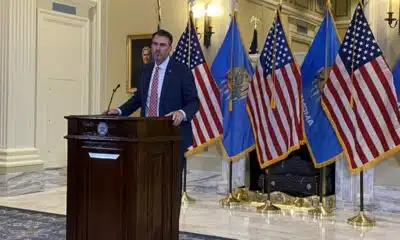News from the South - Arkansas News Feed
States Push Medicaid Work Rules, but Few Programs Help Enrollees Find Jobs
by Sam Whitehead, KFF Health News, Phil Galewitz, KFF Health News and Katheryn Houghton, KFF Health News, Arkansas Advocate
May 2, 2025
For many years, Eric Wunderlin’s health issues made it hard to find stable employment.
Struggling to manage depression and diabetes, Wunderlin worked part-time, minimum-wage retail jobs around Dayton, Ohio, making so little he said he sometimes had to choose between paying rent and buying food.
But in 2018, his CareSource Medicaid health plan offered him help getting a job. It connected him to a life coach, who helped him find full-time work with health benefits. Now, he works for a nonprofit social service agency, a job he said has given him enough financial stability to plan a European vacation next year.
“I feel like a real person and I can go do things,” said Wunderlin, 42. “I feel like I pulled myself out of that slump.”
Republicans in Congress and several states, including Ohio, Iowa, and Montana, are pushing to implement work requirements for nondisabled adults, arguing a mandate would encourage enrollees to find jobs. And for Republicans pushing to require Medicaid enrollees to work, Wunderlin’s story could be held up as evidence that government health coverage can help people find employment and, ultimately, reduce their need for public assistance.
Yet his experience is rare. Medicaid typically does not offer such help, and when states do try to help, such efforts are limited.
And opponents point out that most Medicaid recipients already have jobs and say such a mandate would only kick eligible people off Medicaid, rather than improve their economic prospects. Nearly two-thirds of Medicaid enrollees work, with most of the rest acting as caregivers, going to school, or unable to hold a job due to disability or illness, according to KFF, a health information nonprofit that includes KFF Health News.
Existing efforts to help Medicaid recipients get a job have seen limited success because there’s not a lot of “room to move the needle,” said Ben Sommers, a professor of health care economics at the Harvard T.H. Chan School of Public Health. Most Medicaid enrollees already work — just not in jobs with health benefits, he said.
“The ongoing argument that some folks make is that there are a lot of people freeloading in Medicaid,” he said. “That’s just not supported by the evidence.”
Using Health Programs To Encourage Work
The GOP-controlled Congress could allow or require states to implement a Medicaid work requirement as part of revamping and downsizing Medicaid. The first Trump administration encouraged those work mandates, but many were struck down by federal judges who said they were illegal under federal law.
Policy experts and state officials say more attention should be paid to investments that have helped people find better jobs — from personalized life coaching to, in some cases, health plans’ directly hiring enrollees.
They argue work requirements alone are not enough. “The move to economic mobility requires a ladder, not a stick,” said Farah Khan, a fellow with the Brookings Institution, a nonpartisan think tank.
While Medicaid work requirements have been debated for decades, the issue has become more heated as 40 states and Washington, D.C., have expanded Medicaid eligibility under the Affordable Care Act to the vast majority of low-income adults. More than 20 million adults have gained coverage as a result — but Republicans are now considering eliminating the billions in extra federal funding that helped states extend eligibility beyond groups including many children, pregnant women, and disabled people.
Only Georgia and Arkansas have implemented mandates that some Medicaid enrollees work, volunteer, go to school, or enroll in job training. But a study Sommers co-authored showed no evidence work requirements in Arkansas’ program led to more people working, in part because most of those who could work already were.
In Arkansas, more than 18,000 people lost coverage under the state’s requirement before the policy was suspended by a federal judge in 2019 after less than a year. Those who lost their Medicaid health care reported being unaware or confused about how to report work hours. Since 2023, Arkansas has been giving Medicaid health plans financial incentives to help enrollees train for jobs, but so far few have taken advantage.
Some plans, including Arkansas Blue Cross and Blue Shield’s, offer members $25 to $65 to complete a “career readiness” certificate. In 2024, some Arkansas health plans offered enrollees educational videos about topics including taxes and cryptocurrency.
Health plans don’t have an incentive to help someone find a better-paying job, because that could mean losing a customer if they then make too much to qualify for Medicaid, said Karin VanZant, a vice president at Clearlink Partners, a health care consulting company.
Rather than offering incentives for providing job training, some states, such as California and Ohio, require the insurance companies that run Medicaid to help enrollees find work.
In Montana, where some lawmakers are pushing to implement work requirements, a promising optional program nearly collapsed after state lawmakers required it be outsourced to private contractors.
Within the program’s first three years, the state paired 32,000 Medicaid enrollees with existing federally funded job training programs. Most had higher wages a year after starting training, the state found.
But enrollment has plummeted to just 11 people, according to the latest data provided by the state’s labor department.
Sarah Swanson, who heads the department, said several of the nonprofit contractors that ran the program shuttered. “There was no real part in this for us to deliver direct services to the folks that walked through our door,” she said. The state hopes to revive job training by allowing the department to work alongside contractors to reach more people.
The Hunt for Results
State officials say they don’t have much data to track the effectiveness of existing job programs offered by Medicaid plans.
Stephanie O’Grady, a spokesperson for the Ohio Department of Medicaid, said the state does not track outcomes because “the health plans are not employment agencies.”
Officials with CareSource, which operates Medicaid plans in multiple states, say it has about 2,300 Medicaid and ACA marketplace enrollees in its JobConnect program — about 1,400 in Ohio, 500 in Georgia, and 400 in Indiana.
The program connects job seekers with a life coach who counsels them on skills such as “showing up on time, dressing the part for interviews, and selling yourself during the interview,” said Jesse Reed, CareSource’s director of life services in Ohio.
Since 2023, about 800 people have found jobs through the program, according to Josh Boynton, a senior vice president at CareSource. The health plan itself has hired 29 Medicaid enrollees into customer service, pharmacy, and other positions — nearly all full-time with benefits, he said.
In 2022, California started offering nontraditional health benefits through Medicaid — including help finding jobs — for enrollees experiencing homelessness or serious mental illness, or who are otherwise at risk of avoidable emergency room care. As of September, it had served nearly 280,000 enrollees, but the state doesn’t have data on how many became employed.
The University of Pittsburgh Medical Center, which is among the largest private employers in Pennsylvania, running both a sprawling hospital system and a Medicaid plan, has hired over 10,000 of its Medicaid enrollees since 2021 through its training and support services. Among other jobs, they took positions as warehouse workers, customer service representatives, and medical assistants.
The vast majority left low-paying jobs for full-time positions with health benefits, said Dan LaVallee, a senior director of UPMC Health Plan’s Center for Social Impact. “Our Pathways to Work program is a model for the nation,” he said.
Josh Archambault, a senior fellow with the conservative Cicero Institute, said Medicaid should focus on improving the financial health of those enrolled.
While the first Trump administration approved Medicaid work requirements in 13 states, the Biden administration or federal judges blocked all except Georgia’s.
“I don’t think states have been given ample chance to experiment and try to figure out what works,” Archambault said.
KFF Health News senior correspondent Angela Hart contributed to this report.
KFF Health News is a national newsroom that produces in-depth journalism about health issues and is one of the core operating programs at KFF—an independent source of health policy research, polling, and journalism. Learn more about KFF.
Subscribe to KFF Health News’ free Morning Briefing.
This article first appeared on KFF Health News and is republished here under a Creative Commons license.
GET THE MORNING HEADLINES.
Arkansas Advocate is part of States Newsroom, a nonprofit news network supported by grants and a coalition of donors as a 501c(3) public charity. Arkansas Advocate maintains editorial independence. Contact Editor Sonny Albarado for questions: info@arkansasadvocate.com.
The post States Push Medicaid Work Rules, but Few Programs Help Enrollees Find Jobs appeared first on arkansasadvocate.com
Note: The following A.I. based commentary is not part of the original article, reproduced above, but is offered in the hopes that it will promote greater media literacy and critical thinking, by making any potential bias more visible to the reader –Staff Editor.
Political Bias Rating: Center-Left
The article presents a balanced report on the debate surrounding Medicaid work requirements, offering perspectives from both supporters and opponents. It discusses the experiences of individuals like Eric Wunderlin, whose story supports the potential benefits of work assistance through Medicaid, but it also highlights the limitations and challenges of such programs. The article includes multiple viewpoints, notably from critics who argue that work mandates would harm Medicaid recipients rather than help them. Furthermore, the piece acknowledges the lack of success in existing efforts, which is presented in a neutral, factual manner. While the article touches on political dynamics, it refrains from a strong ideological stance, instead focusing on data and expert opinions, contributing to a more nuanced and impartial exploration of the issue. The framing does lean slightly in favor of critiques of the work requirements, but the overall tone remains balanced without a clear ideological agenda.
News from the South - Arkansas News Feed
Hackett student arrested after shooting threat
SUMMARY: A Hackett student was arrested after an anonymous shooting threat targeting the high school was posted in a student group chat. The threat, reported Monday morning, prompted Sebastian County deputies to station officers at Hackett schools for safety as classes resumed. Deputies, aided by Homeland Security, traced the post back to the teenager within ten hours. Investigators say there is no credible evidence the student intended to carry out the threat. The situation escalated through social media, complicating tracing efforts. The investigation remains active, with possible additional arrests, and deputies will continue a visible presence at the schools.
Deputies increased security at Hackett schools in response.
Subscribe to 40/29 on YouTube now for more: http://bit.ly/PTElbK
Get more Northwest Arkansas news: http://www.4029tv.com
Like us: http://facebook.com/4029news
Follow us: http://twitter.com/4029news
Instagram: https://www.instagram.com/4029news/
News from the South - Arkansas News Feed
Every fall there’s a government shutdown warning. This time it could happen.
by Jennifer Shutt, Arkansas Advocate
September 2, 2025
WASHINGTON — Congress returns to Washington, D.C., this week following an uneventful August recess where little to no progress was made on government funding, even though lawmakers have just weeks left until their shutdown deadline.
Republican leaders will need the support of several Democratic senators to approve a stopgap spending bill before Oct. 1, since lawmakers have once again failed to complete the dozen full-year bills on time.
But what was once a routine bipartisan exercise has taken on heightened stakes, with Democrats and some Republicans increasingly frustrated by the Trump administration’s unilateral spending decisions.
The nonpartisan Government Accountability Office has issued several reports faulting the Trump administration for impounding, or refusing to spend funds approved by Congress, in violation of the law. And dozens of lawsuits have been filed, alleging the administration has acted to supersede Congress’ power of the purse.
The ongoing tension, combined with party leaders’ increasing focus on next year’s midterm elections, makes the possibility of a shutdown higher than it has been for years.
President Donald Trump said in mid-August he was open to meeting with Democratic leaders once they were back in town to negotiate a government funding deal but minimized the importance of talks.
“Well, I will, I guess, but it’s almost a waste of time to meet because they never approve anything,” Trump said.
Senate Democratic Leader Chuck Schumer and House Democratic Leader Hakeem Jeffries released a letter last week urging Speaker Mike Johnson and Senate Majority Leader John Thune to quickly begin negotiating a bipartisan stopgap bill.
“The government funding issue must be resolved in a bipartisan way,” they wrote. “That is the only viable path forward.”
Senate Appropriations Chairwoman Susan Collins, R-Maine, said last week that she wants to keep advancing the full-year spending bills, but that a short-term stopgap would be necessary to give lawmakers enough time.
“We need to avoid a government shutdown, which would be horrendous if that were to occur on October 1,” Collins said, according to remarks provided by her office. “And we also need to avoid having a continuing resolution, by that I mean a stopgap bill that just puts government on automatic pilot for the whole year.
“We’re going to have to have a short-term continuing resolution, but we’re making really good progress with overwhelming bipartisan support, and I hope that will continue.”
Another failure
Congress is supposed to complete work on the dozen annual appropriations bills before the start of the new fiscal year but has failed to do so for decades. This year is no different.
The House and Senate are nowhere near finishing their work on the bills, which provide funding for dozens of departments, including Agriculture, Defense, Education, Energy, Health and Human Services, Homeland Security, Housing and Urban Development, Interior, Justice, State, Transportation and Veterans Affairs.
The bills, which make up about one-third of federal spending, also fund smaller agencies like the National Oceanic and Atmospheric Administration, National Science Foundation and the National Weather Service.
The House has approved two of the dozen bills — Defense and Military Construction-VA. The Senate has passed its Agriculture, Legislative Branch and Military Construction-VA bills.
The House bills have only been supported by GOP lawmakers, while the Senate’s bills are broadly bipartisan, giving that chamber an upper hand if the two chambers begin conferencing full-year bills later this year.
Without a bipartisan, bicameral agreement on how much to spend on all of the bills, it’s highly unlikely Congress will be able to complete its work before the Oct. 1 deadline.
U.S. Senate Majority Leader John Thune, R-South Dakota, speaks at a Greater Sioux Falls Chamber of Commerce Inside Washington luncheon on Aug. 12, 2025. (Photo by Makenzie Huber/South Dakota Searchlight)
Leaders will instead need to reach agreement on a stopgap spending bill that essentially keeps government funding on autopilot until lawmakers can work out a final deal on the full-year bills.
The calendar doesn’t give Speaker Johnson, R-La., and Senate Majority Leader Thune, R-S.D., much time to find compromise with their Democratic counterparts.
Both chambers are in session for three weeks at the beginning of September before breaking for Rosh Hashanah. They’ll return to Capitol Hill on Sept. 29 with less than two days to fund the government or begin a partial shutdown.
Thune said in mid-August at the Greater Sioux Falls Chamber of Commerce Inside Washington luncheon that he expects lawmakers will “have a big fight at the end of September.”
Last shutdown stretched 35 days
It’s been almost seven years since some federal departments and agencies had to navigate a shutdown, when Congress and the first Trump administration were unable to broker a funding deal before a deadline.
A shutdown this year would have substantially more impact than that 35-day debacle since, when that funding lapse began, Congress had approved the Defense, Energy-Water, Labor-HHS-Education, Legislative Branch and Military Construction-VA spending bills.
The departments and agencies funded by those laws, including Congress, weren’t affected by the shutdown.
Lawmakers have failed to send any of the full-year bills to Trump so far this year, so every department and agency would need to implement a shutdown plan if Congress doesn’t approve a stopgap spending bill before Oct. 1.
Federal employees who deal with the preservation of life and property as well as national security will likely be deemed exempt and work without pay until the shutdown ends.
Workers who are not considered essential to the federal government’s operations would be furloughed until Congress and the president broker some sort of funding deal.
Both categories of employees receive back pay once the lapse ends, though that doesn’t extend to federal contractors.
On to the stopgap
Congress regularly approves a stopgap spending bill in September to gain more time to complete negotiations on the full-year appropriations bills.
That continuing resolution, as it’s sometimes called, usually lasts until the last Friday in December when both chambers of Congress are scheduled to be in Washington, D.C.
So a September stopgap would likely last until Friday, Dec. 19, assuming the House and Senate can reach an agreement and hold floor votes in the weeks ahead.
Last year, in the lead-up to the presidential election, lawmakers approved a stopgap bill in September that funded the government through mid-December.
Following the Republican sweep of the November elections, GOP leaders opted not to negotiate the full-year bills and used a second stopgap bill to fund the government until March after a raucous 48 hours on Capitol Hill.
Speaker Johnson took a go-it-alone approach on a third stopgap spending bill, leaving Democrats completely out of the negotiations and jamming the Senate with the legislation.
Schumer and several Democrats ultimately helped Republicans get past the 60-vote legislative filibuster, but most voted against actually passing the stopgap.
The dilemma over forcing a shutdown or helping Republicans pass a stopgap bill will resurface for Schumer in the weeks ahead as he tries to navigate another shutdown deadline amid unified GOP control of Washington.
Arkansas Advocate is part of States Newsroom, a nonprofit news network supported by grants and a coalition of donors as a 501c(3) public charity. Arkansas Advocate maintains editorial independence. Contact Editor Sonny Albarado for questions: info@arkansasadvocate.com.
The post Every fall there’s a government shutdown warning. This time it could happen. appeared first on arkansasadvocate.com
Note: The following A.I. based commentary is not part of the original article, reproduced above, but is offered in the hopes that it will promote greater media literacy and critical thinking, by making any potential bias more visible to the reader –Staff Editor.
Political Bias Rating: Centrist
This content presents a balanced overview of the government shutdown situation, highlighting perspectives and actions from both Republican and Democratic leaders without overtly favoring either side. It includes factual reporting on legislative processes, quotes from key political figures across the aisle, and references to nonpartisan sources, maintaining a neutral tone throughout. The article focuses on the procedural and political challenges without editorializing, reflecting a centrist approach to the topic.
News from the South - Arkansas News Feed
Arkansas Fall forecast: Warmer temperatures and drier conditions expected as drought persists
SUMMARY: Arkansas is expected to experience a cooler and more fall-like September, starting meteorological fall on September 1st. The last week of August was among the coolest on record, and early September will continue with below-average temperatures. A cold front later next week will bring further cooling, making the second weekend of football season comfortable. Mid-September temperatures will remain fairly mild, with highs dropping from mid-80s to mid-70s in Northwest Arkansas and from low 90s to low 80s in the River Valley by month’s end. Fall colors should appear earlier than last year, likely peaking from late October to early November.
The Climate Prediction Center released its outlook for Fall, which shows above-average temperatures continuing through November.
Subscribe to 40/29 on YouTube now for more: http://bit.ly/PTElbK
Get more Northwest Arkansas news: http://www.4029tv.com
Like us: http://facebook.com/4029news
Follow us: http://twitter.com/4029news
Instagram: https://www.instagram.com/4029news/
-
Mississippi Today3 days ago
DEI, campus culture wars spark early battle between likely GOP rivals for governor in Mississippi
-
Mississippi Today7 days ago
Judge: Felony disenfranchisement a factor in ruling on Mississippi Supreme Court districts
-
News from the South - North Carolina News Feed5 days ago
Parasocial party: Why people are excited for the Taylor Swift, Travis Kelce engagement
-
News from the South - Louisiana News Feed6 days ago
K+20: Katrina alters local health care landscape, though underlying ills still the same
-
Our Mississippi Home6 days ago
The Great Backyard Recovery – Helping Birds After the Storm
-
The Center Square6 days ago
U-M Health ends transgender treatment for minors | Michigan
-
Local News5 days ago
Police say Minneapolis church shooter was filled with hatred and admired mass killers
-
Local News Video4 days ago
08/29 Ryan's “Wet End to the Week” Friday Forecast











































